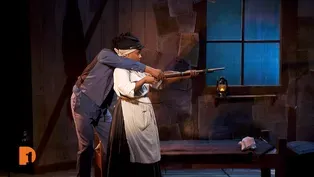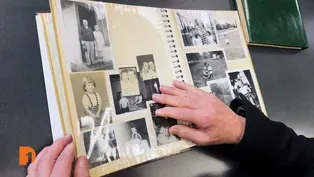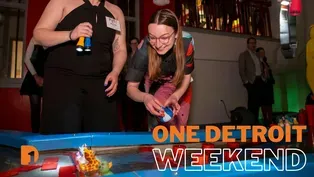
Detroit jazz legend Marion Hayden named 2025 Kresge Eminent Artist
Clip: Season 9 Episode 36 | 5m 35sVideo has Closed Captions
Detroit jazz bassist and educator Marion Hayden named the 2025 Kresge Eminent Artist.
Award-winning jazz bassist, educator and mentor Marion Hayden has been named the 2025 Kresge Eminent Artist, one of metro Detroit’s highest cultural honors. At 68, Hayden is the youngest artist to ever receive the award. One Detroit contributor Stephen Henderson talks with Hayden about her musical journey, Detroit’s jazz legacy, and the legendary musicians that have influenced her career.
Problems with Closed Captions? Closed Captioning Feedback
Problems with Closed Captions? Closed Captioning Feedback
One Detroit is a local public television program presented by Detroit PBS

Detroit jazz legend Marion Hayden named 2025 Kresge Eminent Artist
Clip: Season 9 Episode 36 | 5m 35sVideo has Closed Captions
Award-winning jazz bassist, educator and mentor Marion Hayden has been named the 2025 Kresge Eminent Artist, one of metro Detroit’s highest cultural honors. At 68, Hayden is the youngest artist to ever receive the award. One Detroit contributor Stephen Henderson talks with Hayden about her musical journey, Detroit’s jazz legacy, and the legendary musicians that have influenced her career.
Problems with Closed Captions? Closed Captioning Feedback
How to Watch One Detroit
One Detroit is available to stream on pbs.org and the free PBS App, available on iPhone, Apple TV, Android TV, Android smartphones, Amazon Fire TV, Amazon Fire Tablet, Roku, Samsung Smart TV, and Vizio.
Providing Support for PBS.org
Learn Moreabout PBS online sponsorship(upbeat electronic music) - Now, this is considered our area's greatest arts honor, is that how you feel?
- I totally feel that way, it's like a... Getting a big giant hug from my community that I love, I just love this community, it's my passion, it's my muse, I carry the banner of Detroit wherever I go, so yes, it feels great.
- This is an award that recognizes everything that you've done, the span of your career, so let's talk about that career and kind of how you got into music, into the bass, which I think I've told you before, I was a tuba player in college, I have a double bass at home and plunk around on it, it is one of my favorite instruments, so talk about how you got to this point.
- Well, I have to say, one of the wonderful things about growing up in Detroit has... Well, first of all, I should give complete credit to my parents Marian Ford-Hayden-Thomas, she ended up getting remarried after my father passed, and Herbert E. Hayden, and our little house that we grew up in and the wonderful neighborhood of Russell Woods on Fullerton Street, and they were just wonderful parents, they never put any restrictions on me as a young woman, as a girl, as to what girls could do, my mother was a chemist, so she knew no boundaries of that sort, so... Well, I just started taking cello lessons when I was about nine in our great public... Detroit public-school music education programs... - [Stephen] How important was that?
- Oh, the music at...
The public school music programs are so important, and I always want to...
I'm always on my little bandwagon, I'm always standing on my soapbox about continuing to support them for the young people that are in school now, and so, I was a little girl taking lessons in my school, took cello lessons at nine, and then, when I got tall enough to stand up to the bass, 'cause I've always wanted to play bass, I was about 12, I switched over to bass, and I had a lot of jazz in my household, care of my dad, who was a huge jazz fan and record collector, and kind of a closeted jazz pianist, he was really good, and just...
He was...
He exposed me to such great music, and then, he made what I consider to be just such a wonderful gesture for me, he took me to a summertime jazz camp called Metro Arts, which was right here on Selden Street in Detroit, and that's where I met the likes of Wendell Harrison, Marcus Belgrave, Harold McKinney, and so many of the great jazz musicians which... Who have become so influential for me and others, and these were the torch-bearers, the people that were really keeping the music alive at that time, which would been... Have been the, you know, early '70s, you know, and that's how I really... That's how I caught the jazz bug, and from then on, it was just...
It just... At some point, you hear something and you just know this is something that you have to hear in your ears forever, and that was what it was for me.
- Yeah, yeah.
So I always think of music as a form of expression, and that expression is really important.
(upbeat bass music) Talk about that expression, the things that you're saying and trying to communicate when you're playing.
- Well, one thing about...
Especially certainly at this point in my career, is I have a pretty big mental library of things, there's a lot of music that I've played in a lot of different genres, I've played...
I played the music of Argentinian tango, I played music from, you know, Puerto Rico and Cuban, I played...
I have played folk music, some classical music, pretty much all types of jazz and all the different spheres that we work in, and so, I'm a collector of themes and a collector of musical moments, and so, when I play, especially something like a solo piece, then basically, I am able to...
I try to weave those moments together and threads so that they can be interesting, I try to find things that are interesting from my mental collection, and it's very important, I think, especially as a... For a bass player, that we have a lot of experience because the bass is a very ubiquitous instrument in all ensembles.
- So much more versatile than anybody ever thinks it is.
(laughs) - It is, the bass is in so many different places, and so, I'm...
I have an opportunity to really be very broadly expressive in so many different ways, I mean, as I say, you know, rock... Indie, rock, all kinds of things, gospel, of course, you know, all the branches of black music, and so, I try to bring all those things to bear when I perform and try to... Just try to be broadly expressive, really tell... Really talk about the music that I'm playing in a way that is befitting of that particular... Any particular thing I'm doing.
Video has Closed Captions
Detroit Public Theatre presents “Confederates,” a play about racism and gender bias in America. (7m 43s)
Video has Closed Captions
One Detroit contributor Nolan Finley shares his family’s history during the Great Migration. (7m 21s)
One Detroit Weekend | Things to do around Detroit this weekend: March 7, 2025
Video has Closed Captions
One Detroit contributor Cecelia Sharpe shares events happening around Detroit this weekend. (1m 42s)
Providing Support for PBS.org
Learn Moreabout PBS online sponsorshipOne Detroit is a local public television program presented by Detroit PBS














